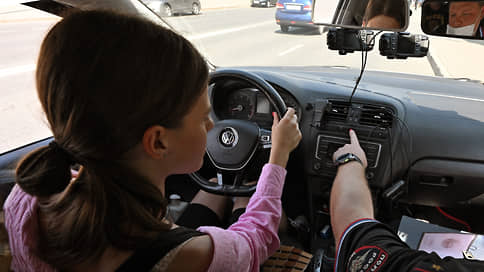The traffic police shares control levers – Picture of the day – Kommersant
[ad_1]

You will not need to obtain a driver’s medical certificate to pass exams at the traffic police. This follows from the draft government decree prepared by the Ministry of Internal Affairs. The medical board still has to be passed, but the traffic police will receive information about the health of citizens in electronic form from the Ministry of Health. By the same resolution, the State Traffic Inspectorate plans to tighten the rules for retaking driving licenses and introduce a new procedure for “suspending” the exam.
Published draft resolution with the new rules for conducting exams in the traffic police was developed in the development of amendments to the law “On Road Safety”. The latter exists so far in the form of a draft planned for consideration by the State Duma in October. It is planned that driver’s medical boards will transfer the conclusions issued to citizens to the information system of the Ministry of Health. Thus, medical certificates will become electronic, the traffic police will itself request the necessary data.
In the draft resolution, which should come into force on March 1, 2023, along with the law, the medical certificate is excluded from the list of documents that must be presented to a citizen at the traffic police.
At the same time, a citizen is not exempted from passing a medical examination. But this examination will not be the only source of information about his health. If the driver has a medical contraindication to driving (for example, a serious visual impairment was found during a medical examination or medical examination) or a previously issued medical certificate was canceled and he did not come to the re-commission, the certificate will be considered invalid. If a citizen gets behind the wheel again, he will be brought under Art. 12.7 of the Code of Administrative Offenses for driving a car without a license (fine – 5-15 thousand rubles, while the car is sent to a car impound).
The project contains a number of other innovations. If a driver candidate does not pass one of the exams on the third attempt, the next chance will be given no earlier than six months (now re-examination is allowed after a month), but no later than nine months (now the deadline is three months). The decision, according to Kommersant, is due to the high workload that poorly prepared citizens create for the examination departments during numerous retakes.
A new list of grounds for suspension of the examination and the issuance of rights is also being introduced.
The procedure will be suspended, for example, if between the exam and the issuance of rights, the citizen’s passport or medical certificate has expired. You will need to get a fresh document and get a service. Refusal to be photographed will also be grounds for suspension of the procedure.
It describes who can be behind the duplicate controls during the exam: if the owner of the car is the traffic police, then the policeman, if the driving school, then the instructor (sometimes he himself is the owner of the car). In the latter case, the machine must be equipped with an alarm system. Whenever you touch the duplicate pedals, the light will turn on and sound will be heard: everything is recorded on video and audio. This should prevent the instructor from “helping” a student pass an exam with duplicate pedals. Now it is difficult to control such a violation, even taking into account the video recording in the car.
The scheme for exchanging foreign rights for Russian ones is also being tightened: visiting truck and bus drivers will have to present to the traffic police a document confirming training and passing an exam at a driving school.
A similar decision has been discussed by the traffic police for a long time due to the high accident rate due to the fault of migrant drivers.
Compulsory training should also be introduced when exchanging category B driving licenses due to the large number of visiting taxi drivers who also often get into accidents, Elena Zaitseva, president of the National Union of Driving School Associations, believes. President of the Interregional Association of Driving Schools Tatyana Shutyleva supports the rule that allows the instructor to be behind the duplicate controls of the training machine. Due to the current ban, she explains, the actual owners of cars (80% of the exams are conducted on the cars of driving schools) in the event of a threat of an accident cannot intervene from the back seat. Ms. Shutyleva recalls that driving schools provide cars for exams “free of charge”: installing an alarm will most likely require registration of a change in the design of training cars, which is a complex procedure in itself.
[ad_2]
Source link








